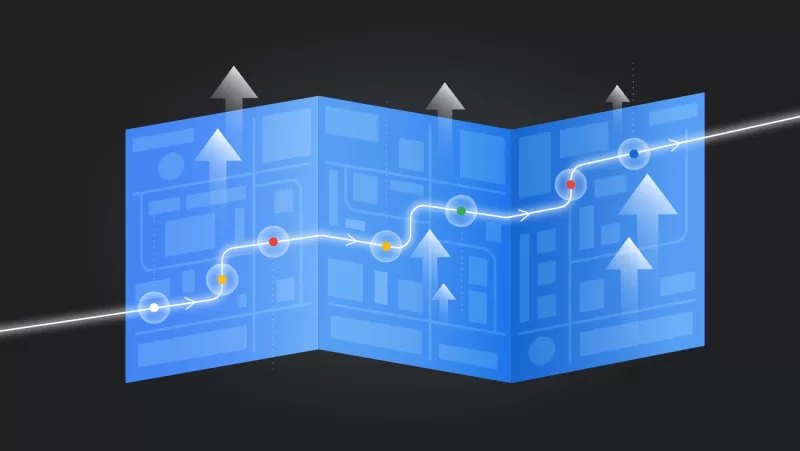7 Key Principles for Effective AI Regulation

AI is a game-changer, no doubt about it. But with great power comes great responsibility, right? That's why lawmakers from coast to coast are rolling up their sleeves to figure out how to regulate this beast. So, what does all this legislative hustle mean for us in practice?
Right now, there are five bills floating around Congress and seven guiding principles that are paving the way for not just managing the risks but also grabbing the opportunities AI brings to the table.
Why the U.S. Government's Approach is Working
Over the last year, the U.S. government has been pretty smart about tackling AI regulation. They've set up some solid guidelines for everyone from developers to users. And get this, even with all the political bickering, Congress is stepping up in a way that's both thoughtful and balanced. The House has this cool bipartisan committee, packed with folks who know their stuff about computers and AI, and they're working on new laws. Meanwhile, the Senate's Bipartisan AI Working Group just dropped their "Driving U.S. Innovation in Artificial Intelligence" policy roadmap last month. It's chock-full of ideas on how to juggle AI's risks and rewards.
We're all for these moves for three big reasons:
First off, the government gets that AI can be a game-changer in fields like science, healthcare, and energy. They're all about using a practical approach to weigh the risks and benefits. That's key if we want to keep leading the AI charge.
Second, our leaders are seeing dollar signs with AI. McKinsey says it could add a whopping $17 to $25 trillion to the global economy every year by 2030. That's like the entire U.S. GDP right now! The White House and the Senate are laying out steps to make sure we can tap into that potential, from giving more people access to AI tools to getting our workforce ready for the AI age.
And third, these efforts show that we need both the private and public sectors to team up on AI. We're in a global tech race, and it's not just about who invents something first. It's about who can use it best across all kinds of industries. That includes beefing up our cyberdefense and national security, where AI can help us flip the script on the "defender's dilemma."
Google Endorses the Five Bills Mentioned in the Senate’s AI Policy Roadmap
We're throwing our support behind those five bills, and we're all for more laws that cover other important areas too.
AI is like the steam engine, electricity, or the internet—it's a big deal. To really make the most of it, we need everyone from the public to the private sector to work together. That way, we can move from being wowed by AI to figuring out how to use it in real life, so everyone can benefit.
Seven Principles for Responsible Regulation
Companies in democracies have been leading the charge in AI, but we can't rest on our laurels. We need to keep pushing for future AI breakthroughs because, let's face it, we're ahead in some areas but lagging in others.
To keep the innovation train rolling while keeping things responsible, we suggest these seven principles for AI regulation:
- Support responsible innovation. The Senate's roadmap kicks off by calling for more cash for both AI innovation and safety measures. That's smart because they go hand in hand. Better tech means safer systems, and while there's always some uncertainty with new tech, we can still build trust without slowing down the good stuff.
- Focus on outputs. Let's push for AI that churns out quality stuff while keeping the bad stuff at bay. By zeroing in on what AI actually produces, regulators can tackle issues head-on without getting bogged down in the nitty-gritty of computer science. That keeps things grounded in real-world problems and avoids overdoing it with regulations that might stifle AI's potential.
- Strike a sound copyright balance. Fair use and copyright exceptions are great for science and learning, but website owners should be able to opt out of having their content used for AI training with machine-readable tools.
- Plug gaps in existing laws. If something's illegal without AI, it's illegal with AI. No need to reinvent the wheel; we just need to fill in the gaps where current laws don't quite fit AI.
- Empower existing agencies. There's no one-size-fits-all for AI regulation, just like there's no single law for all uses of electricity. We need to beef up existing agencies and make sure they're all AI-savvy.
- Adopt a hub-and-spoke model. This model sets up a central hub of tech know-how at a place like NIST to help the government get a better handle on AI and support different sectors, recognizing that banking issues are different from those in pharmaceuticals or transportation.
- Strive for alignment. With so many AI governance proposals out there, including over 600 bills in U.S. states alone, we need to focus on real harm, not just throw a blanket over research. And since AI is a global thing, our regulations should align with international standards as much as possible.
Looking Down the Road
AI is already making waves, from the tools you use every day—like Google Search, Translate, Maps, Gmail, and YouTube—to tackling big societal challenges. It's not just a tech breakthrough; it's a breakthrough in making breakthroughs happen faster.
Take Google DeepMind's AlphaFold, for example. It's predicted the 3D shapes of nearly all known proteins and how they interact. Or how about using AI to predict floods up to seven days in advance, saving lives for 460 million people in 80 countries? And then there's mapping the pathways of neurons in the human brain, uncovering new structures and helping us understand how we think, learn, and remember.
AI can keep driving these kinds of breakthroughs if we keep our eyes on the prize—its long-term potential.
That means staying consistent, thoughtful, and working together, always keeping in mind the benefits we can all enjoy if we get this right.
Related article
 Midjourney Unveils Cutting-Edge AI Video Generator for Creative Content
Midjourney's AI Video Generation BreakthroughMidjourney has unveiled its inaugural AI video generation tool, marking a significant expansion beyond its renowned image creation capabilities. The initial release enables users to transform both uploaded
Midjourney Unveils Cutting-Edge AI Video Generator for Creative Content
Midjourney's AI Video Generation BreakthroughMidjourney has unveiled its inaugural AI video generation tool, marking a significant expansion beyond its renowned image creation capabilities. The initial release enables users to transform both uploaded
 Trump Prioritizes AI Growth Over Regulation in Race to Outpace China
The Trump administration unveiled its landmark AI Action Plan on Wednesday, marking a decisive break from the Biden administration's risk-averse AI policies. The ambitious blueprint prioritizes aggressive infrastructure development, sweeping regulato
Trump Prioritizes AI Growth Over Regulation in Race to Outpace China
The Trump administration unveiled its landmark AI Action Plan on Wednesday, marking a decisive break from the Biden administration's risk-averse AI policies. The ambitious blueprint prioritizes aggressive infrastructure development, sweeping regulato
 YouTube Integrates Veo 3 AI Video Tool Directly Into Shorts Platform
YouTube Shorts to Feature Veo 3 AI Video Model This SummerYouTube CEO Neal Mohan revealed during his Cannes Lions keynote that the platform's cutting-edge Veo 3 AI video generation technology will debut on YouTube Shorts later this summer. This follo
Comments (26)
0/200
YouTube Integrates Veo 3 AI Video Tool Directly Into Shorts Platform
YouTube Shorts to Feature Veo 3 AI Video Model This SummerYouTube CEO Neal Mohan revealed during his Cannes Lions keynote that the platform's cutting-edge Veo 3 AI video generation technology will debut on YouTube Shorts later this summer. This follo
Comments (26)
0/200
![MatthewSanchez]() MatthewSanchez
MatthewSanchez
 August 15, 2025 at 5:00:59 PM EDT
August 15, 2025 at 5:00:59 PM EDT
AI regulation sounds crucial but man, lawmakers wrestling with this tech beast feels like watching my grandma debug code 😅. Hope they nail it without stifling innovation.


 0
0
![RogerSanchez]() RogerSanchez
RogerSanchez
 April 22, 2025 at 6:33:50 PM EDT
April 22, 2025 at 6:33:50 PM EDT
AI 규제에 대한 기본 원칙을 잘 설명해주지만, 실제 사례가 더 많았으면 좋겠어요. 그래도 법률 관련 정보를 쉽게 이해할 수 있어서 좋네요! 😊


 0
0
![NicholasAdams]() NicholasAdams
NicholasAdams
 April 20, 2025 at 1:27:54 PM EDT
April 20, 2025 at 1:27:54 PM EDT
AI規制についての基本原則を理解するのに役立ちますが、もう少し具体的な例が欲しいですね。でも、法律関係の情報を追うのに便利ですよ!😄


 0
0
![DouglasMitchell]() DouglasMitchell
DouglasMitchell
 April 20, 2025 at 1:09:24 AM EDT
April 20, 2025 at 1:09:24 AM EDT
Estos principios de regulación de IA suenan bien en el papel, pero no estoy seguro de cómo se aplicarán en la práctica. ¿Quién los va a hacer cumplir? Sin embargo, es un paso en la dirección correcta, supongo. 🤔📜


 0
0
![CharlesWhite]() CharlesWhite
CharlesWhite
 April 19, 2025 at 9:16:48 AM EDT
April 19, 2025 at 9:16:48 AM EDT
This tool really breaks down the complexities of AI regulation into understandable chunks. It's super helpful for anyone trying to stay updated on the legal side of things. Only wish it had more real-world examples to make it more relatable. Still, a must-have for policy enthusiasts! 😊


 0
0
![HarryLewis]() HarryLewis
HarryLewis
 April 19, 2025 at 2:37:17 AM EDT
April 19, 2025 at 2:37:17 AM EDT
AI規制に関する7つの原則はとても役立つけど、もう少し具体的な例が欲しいな。でも、法律の動きを追うのに便利だし、初心者にも分かりやすいから、まあまあ満足かな。😊


 0
0

AI is a game-changer, no doubt about it. But with great power comes great responsibility, right? That's why lawmakers from coast to coast are rolling up their sleeves to figure out how to regulate this beast. So, what does all this legislative hustle mean for us in practice?
Right now, there are five bills floating around Congress and seven guiding principles that are paving the way for not just managing the risks but also grabbing the opportunities AI brings to the table.
Why the U.S. Government's Approach is Working
Over the last year, the U.S. government has been pretty smart about tackling AI regulation. They've set up some solid guidelines for everyone from developers to users. And get this, even with all the political bickering, Congress is stepping up in a way that's both thoughtful and balanced. The House has this cool bipartisan committee, packed with folks who know their stuff about computers and AI, and they're working on new laws. Meanwhile, the Senate's Bipartisan AI Working Group just dropped their "Driving U.S. Innovation in Artificial Intelligence" policy roadmap last month. It's chock-full of ideas on how to juggle AI's risks and rewards.
We're all for these moves for three big reasons:
First off, the government gets that AI can be a game-changer in fields like science, healthcare, and energy. They're all about using a practical approach to weigh the risks and benefits. That's key if we want to keep leading the AI charge.
Second, our leaders are seeing dollar signs with AI. McKinsey says it could add a whopping $17 to $25 trillion to the global economy every year by 2030. That's like the entire U.S. GDP right now! The White House and the Senate are laying out steps to make sure we can tap into that potential, from giving more people access to AI tools to getting our workforce ready for the AI age.
And third, these efforts show that we need both the private and public sectors to team up on AI. We're in a global tech race, and it's not just about who invents something first. It's about who can use it best across all kinds of industries. That includes beefing up our cyberdefense and national security, where AI can help us flip the script on the "defender's dilemma."
Google Endorses the Five Bills Mentioned in the Senate’s AI Policy Roadmap
We're throwing our support behind those five bills, and we're all for more laws that cover other important areas too.
Seven Principles for Responsible Regulation
Companies in democracies have been leading the charge in AI, but we can't rest on our laurels. We need to keep pushing for future AI breakthroughs because, let's face it, we're ahead in some areas but lagging in others.
To keep the innovation train rolling while keeping things responsible, we suggest these seven principles for AI regulation:
- Support responsible innovation. The Senate's roadmap kicks off by calling for more cash for both AI innovation and safety measures. That's smart because they go hand in hand. Better tech means safer systems, and while there's always some uncertainty with new tech, we can still build trust without slowing down the good stuff.
- Focus on outputs. Let's push for AI that churns out quality stuff while keeping the bad stuff at bay. By zeroing in on what AI actually produces, regulators can tackle issues head-on without getting bogged down in the nitty-gritty of computer science. That keeps things grounded in real-world problems and avoids overdoing it with regulations that might stifle AI's potential.
- Strike a sound copyright balance. Fair use and copyright exceptions are great for science and learning, but website owners should be able to opt out of having their content used for AI training with machine-readable tools.
- Plug gaps in existing laws. If something's illegal without AI, it's illegal with AI. No need to reinvent the wheel; we just need to fill in the gaps where current laws don't quite fit AI.
- Empower existing agencies. There's no one-size-fits-all for AI regulation, just like there's no single law for all uses of electricity. We need to beef up existing agencies and make sure they're all AI-savvy.
- Adopt a hub-and-spoke model. This model sets up a central hub of tech know-how at a place like NIST to help the government get a better handle on AI and support different sectors, recognizing that banking issues are different from those in pharmaceuticals or transportation.
- Strive for alignment. With so many AI governance proposals out there, including over 600 bills in U.S. states alone, we need to focus on real harm, not just throw a blanket over research. And since AI is a global thing, our regulations should align with international standards as much as possible.
Looking Down the Road
AI is already making waves, from the tools you use every day—like Google Search, Translate, Maps, Gmail, and YouTube—to tackling big societal challenges. It's not just a tech breakthrough; it's a breakthrough in making breakthroughs happen faster.
Take Google DeepMind's AlphaFold, for example. It's predicted the 3D shapes of nearly all known proteins and how they interact. Or how about using AI to predict floods up to seven days in advance, saving lives for 460 million people in 80 countries? And then there's mapping the pathways of neurons in the human brain, uncovering new structures and helping us understand how we think, learn, and remember.
AI can keep driving these kinds of breakthroughs if we keep our eyes on the prize—its long-term potential.
That means staying consistent, thoughtful, and working together, always keeping in mind the benefits we can all enjoy if we get this right.
 Midjourney Unveils Cutting-Edge AI Video Generator for Creative Content
Midjourney's AI Video Generation BreakthroughMidjourney has unveiled its inaugural AI video generation tool, marking a significant expansion beyond its renowned image creation capabilities. The initial release enables users to transform both uploaded
Midjourney Unveils Cutting-Edge AI Video Generator for Creative Content
Midjourney's AI Video Generation BreakthroughMidjourney has unveiled its inaugural AI video generation tool, marking a significant expansion beyond its renowned image creation capabilities. The initial release enables users to transform both uploaded
 Trump Prioritizes AI Growth Over Regulation in Race to Outpace China
The Trump administration unveiled its landmark AI Action Plan on Wednesday, marking a decisive break from the Biden administration's risk-averse AI policies. The ambitious blueprint prioritizes aggressive infrastructure development, sweeping regulato
Trump Prioritizes AI Growth Over Regulation in Race to Outpace China
The Trump administration unveiled its landmark AI Action Plan on Wednesday, marking a decisive break from the Biden administration's risk-averse AI policies. The ambitious blueprint prioritizes aggressive infrastructure development, sweeping regulato
 YouTube Integrates Veo 3 AI Video Tool Directly Into Shorts Platform
YouTube Shorts to Feature Veo 3 AI Video Model This SummerYouTube CEO Neal Mohan revealed during his Cannes Lions keynote that the platform's cutting-edge Veo 3 AI video generation technology will debut on YouTube Shorts later this summer. This follo
YouTube Integrates Veo 3 AI Video Tool Directly Into Shorts Platform
YouTube Shorts to Feature Veo 3 AI Video Model This SummerYouTube CEO Neal Mohan revealed during his Cannes Lions keynote that the platform's cutting-edge Veo 3 AI video generation technology will debut on YouTube Shorts later this summer. This follo
 August 15, 2025 at 5:00:59 PM EDT
August 15, 2025 at 5:00:59 PM EDT
AI regulation sounds crucial but man, lawmakers wrestling with this tech beast feels like watching my grandma debug code 😅. Hope they nail it without stifling innovation.


 0
0
 April 22, 2025 at 6:33:50 PM EDT
April 22, 2025 at 6:33:50 PM EDT
AI 규제에 대한 기본 원칙을 잘 설명해주지만, 실제 사례가 더 많았으면 좋겠어요. 그래도 법률 관련 정보를 쉽게 이해할 수 있어서 좋네요! 😊


 0
0
 April 20, 2025 at 1:27:54 PM EDT
April 20, 2025 at 1:27:54 PM EDT
AI規制についての基本原則を理解するのに役立ちますが、もう少し具体的な例が欲しいですね。でも、法律関係の情報を追うのに便利ですよ!😄


 0
0
 April 20, 2025 at 1:09:24 AM EDT
April 20, 2025 at 1:09:24 AM EDT
Estos principios de regulación de IA suenan bien en el papel, pero no estoy seguro de cómo se aplicarán en la práctica. ¿Quién los va a hacer cumplir? Sin embargo, es un paso en la dirección correcta, supongo. 🤔📜


 0
0
 April 19, 2025 at 9:16:48 AM EDT
April 19, 2025 at 9:16:48 AM EDT
This tool really breaks down the complexities of AI regulation into understandable chunks. It's super helpful for anyone trying to stay updated on the legal side of things. Only wish it had more real-world examples to make it more relatable. Still, a must-have for policy enthusiasts! 😊


 0
0
 April 19, 2025 at 2:37:17 AM EDT
April 19, 2025 at 2:37:17 AM EDT
AI規制に関する7つの原則はとても役立つけど、もう少し具体的な例が欲しいな。でも、法律の動きを追うのに便利だし、初心者にも分かりやすいから、まあまあ満足かな。😊


 0
0





























